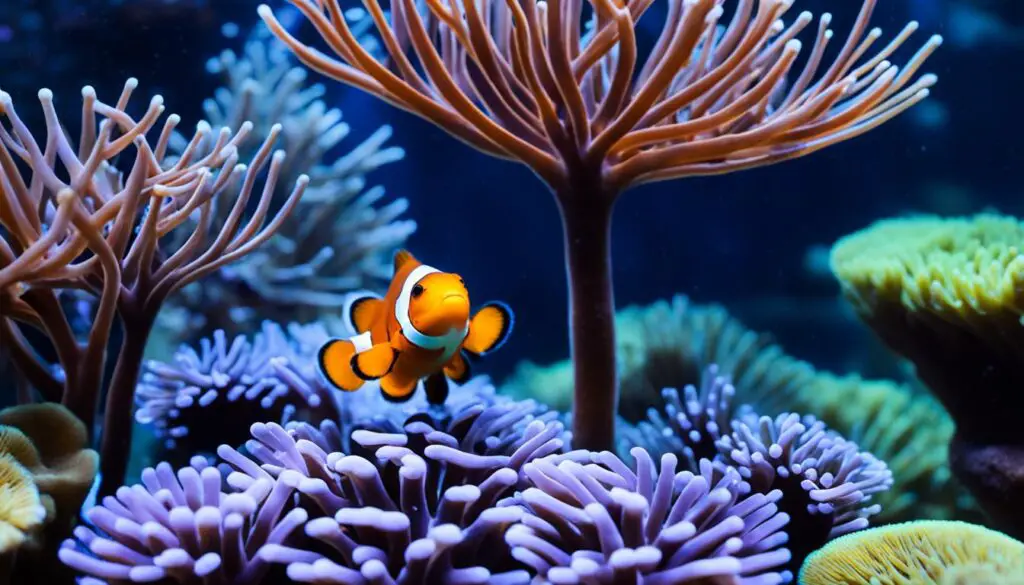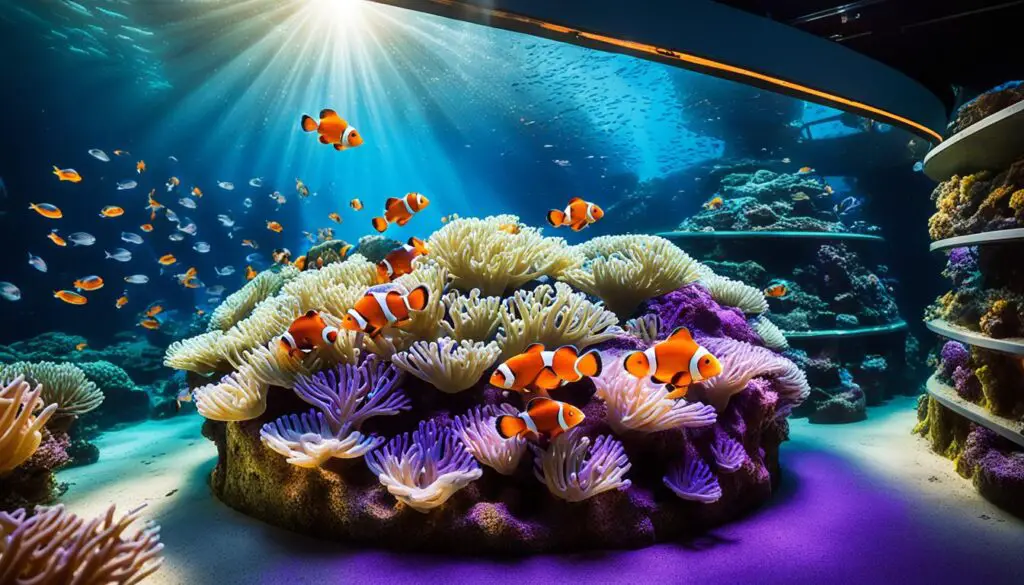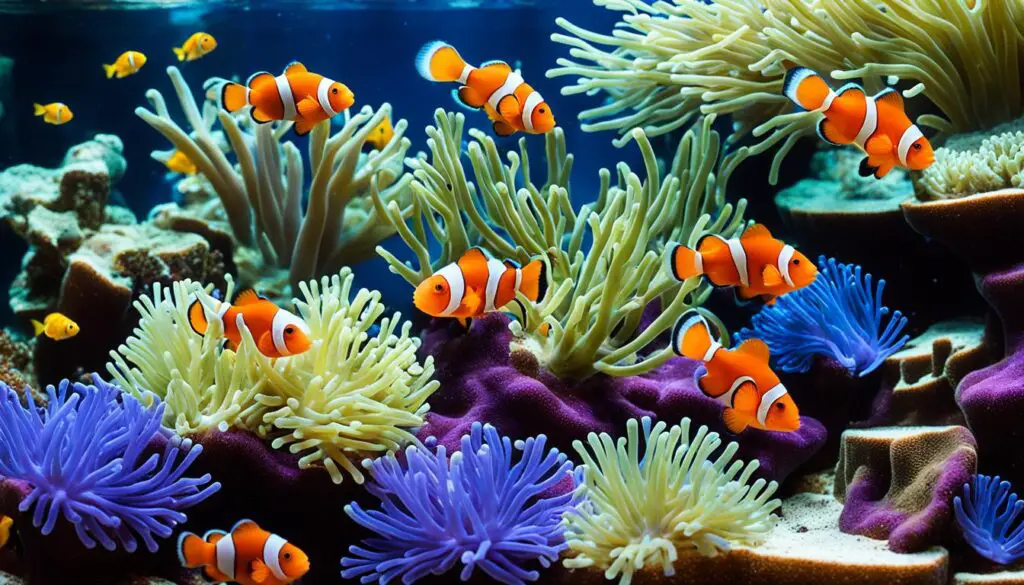Making a Difference: Clownfish Tank Conservation Impact
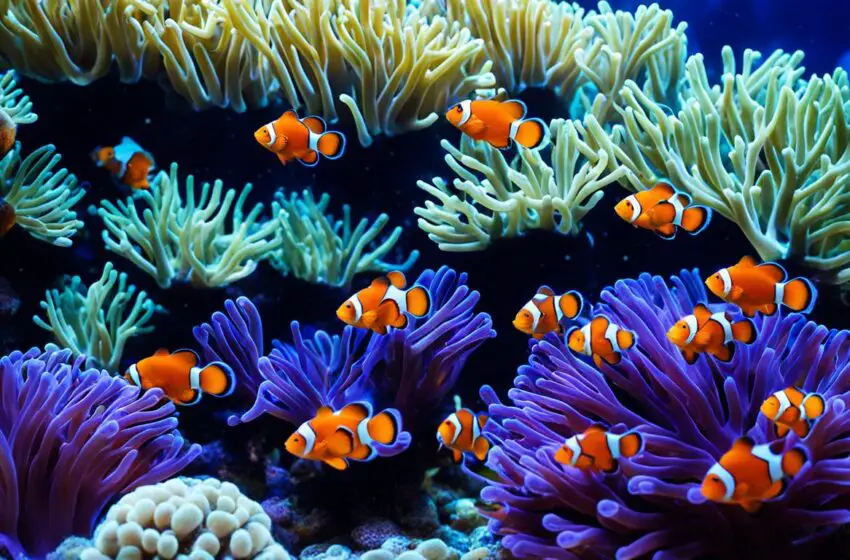
Clownfish are in a tough spot. They’re losing their homes, facing endangerment, and may even disappear. Why? Climate change and the damage to coral reefs. These beautiful fish can’t survive without their reef homes.
Warm oceans from climate change are making the coral reefs die off. This is a big problem because clownfish live in these reefs. As the reefs fade away, so do the homes of clownfish. This puts them in danger.
But, there’s something we can do. We can work to save clownfish by protecting the oceans they live in. This means educating people and taking real steps to help these fish. If we act now, we can make sure they continue to live and the oceans stay healthy.
Key Takeaways:
- Clownfish are at risk of habitat loss and endangerment due to climate change and the degradation of coral reefs.
- Rising ocean temperatures and coral bleaching threaten the survival of clownfish.
- Climate change disrupts the relationship between clownfish and anemone and leads to the loss of suitable habitats.
- Overfishing and habitat destruction reduce the genetic diversity of clownfish, making them more susceptible to climate change impacts.
- Sustainable marine conservation efforts and public awareness are crucial in preserving clownfish populations and their habitats.
The Impact of Climate Change on Coral Reefs and Clownfish
Climate change is great news for the health and survival of coral reefs. This directly affects clownfish and their homes. The biggest issue for coral reefs is coral bleaching from warm ocean waters. Coral reefs lose their colors and biodiversity because of this.
Coral bleaching makes homes unsuitable for clownfish. They use coral reefs for shelter, protection, and food. With warmer ocean waters, clownfish risk losing their homes. They find it hard to change with their environment due to their genes.
For clownfish to thrive, we must save coral reefs. This is possible through careful conservation actions. Cutting down on carbon emissions is key. This helps in lessening the impact on coral reefs and the life they support.
Climate change endangers clownfish by threatening their coral reef homes. Warm ocean waters and coral bleaching destroy their habitats.
Impact of Climate Change on Clownfish
Clownfish play a special role in coral reefs. They depend on anemones, and they help them too. But climate change hurts both. It’s hard for clownfish to find new homes if their anemones disappear.
Protecting coral reefs is critical. It’s not just good for clownfish but for many other sea animals. We need to act responsibly in our oceans. This means keeping fish stocks healthy and spreading the word about marine care.
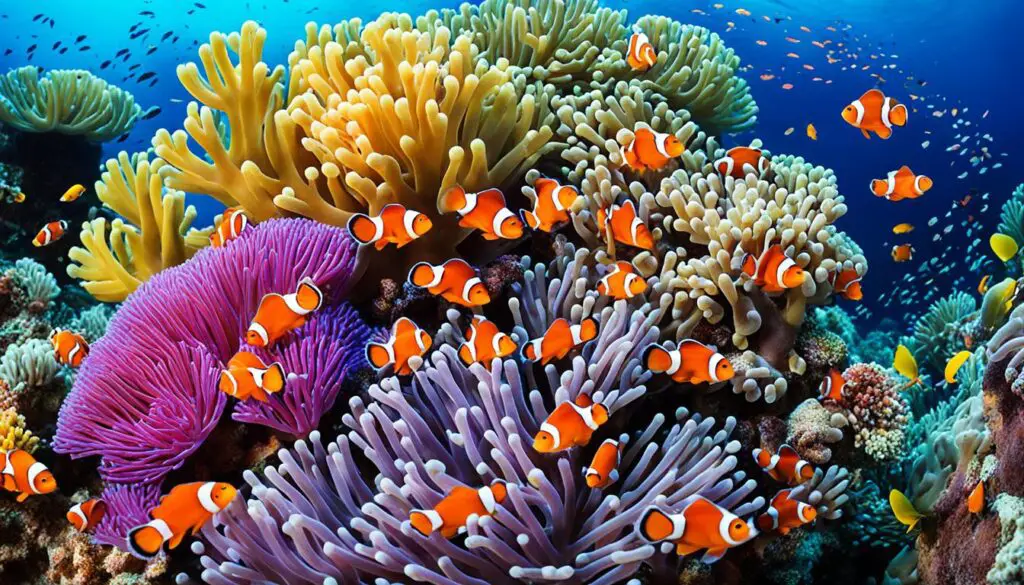
The Importance of Anemone for Clownfish Adaptation
Clownfish depend on anemones for survival in the wild. Anemones are like safe homes for them, protecting them from larger fish. This allows clownfish to live in dangerous waters. In exchange, clownfish provide food and help anemones grow.
But, this partnership is in real trouble. Climate change and fewer anemones are making it hard for clownfish to survive. As the environment changes, their safe homes are disappearing. This makes life difficult for both clownfish and anemones.
Climate change has already taken away a lot of their living space. And, the lack of genetic variety makes it hard for clownfish to adapt. Without the help from anemones, their survival becomes much tougher.
To save clownfish, we must protect their homes and keep fishing in check. Protecting coral reefs is key, as it helps the anemones too. It gives clownfish a better chance at life. Also, fishing responsibly keeps the ocean’s balance right. This ensures there’s enough food for both clownfish and anemones.
The connection between clownfish and anemones shows how amazing nature is. By saving them, we also protect the sea’s diversity. It’s important for the health of our oceans.
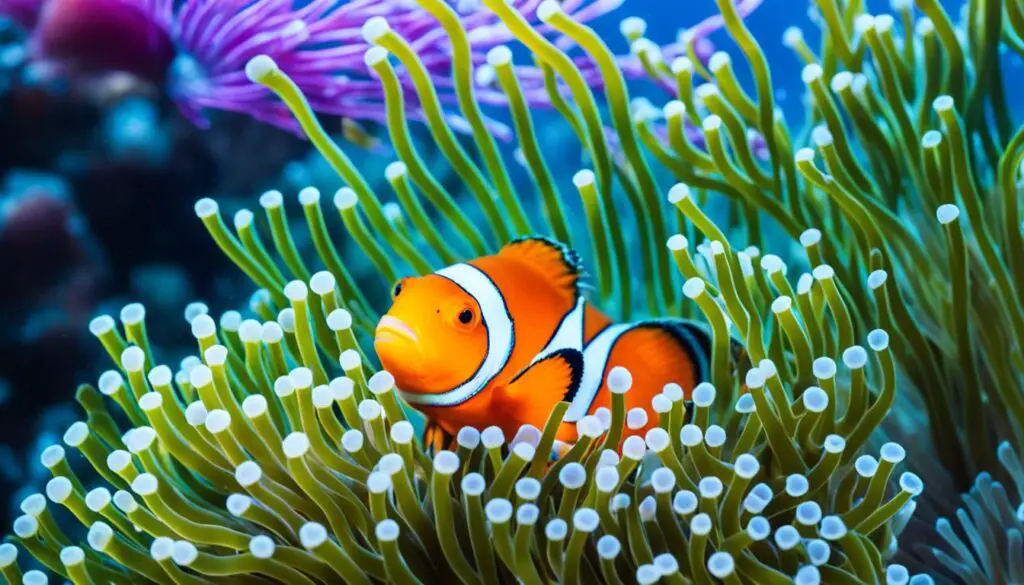
Helpful Tips for Clownfish Tank Owners:
- Provide a suitable anemone for your clownfish tank to mimic their natural habitat.
- Maintain proper water parameters to ensure the health and well-being of both clownfish and anemones.
- Establish a balanced ecosystem in your tank by introducing other compatible marine species.
- Regularly monitor water quality and perform necessary maintenance to prevent any negative impact on both clownfish and anemones.
- Consult with experts or experienced aquarists for guidance on proper care and maintenance of clownfish and anemone tanks.
“The partnership between clownfish and anemones is a remarkable example of nature’s intricate connections. By understanding and valuing this symbiotic relationship, we can contribute to the conservation of these enchanting marine species.” – Marine Biologist, Dr. Emily Roberts
Conclusion
After looking at the risks from climate change and coral reef loss, it’s clear we need to act fast to save clownfish. We can do this by focusing on marine friendly actions. This includes fighting pollution and managing how we fish. Such steps can really help keep clownfish safe and their homes in good shape.
Helping clownfish survive isn’t just about them. It’s key for keeping everything in the reef, including other fish and plants, healthy. The health of these pretty fish reflects how well the entire reef is doing. Together, we can do our part to keep reefs and the climate healthy.
To really protect clownfish and their homes, we must tackle the big issues behind climate change. This means moving toward cleaner energy, pushing for climate saving policies, and making everyone aware of these issues. By doing these things, we aim for a world where clownfish can live well, now and for a long time.
FAQ
Why are clownfish at risk of endangerment and extinction?
Clownfish face risks because their homes are disappearing. This is due to habitat loss and climate change. The main place where clownfish live, coral reefs, is also degrading.
What is causing the deterioration of coral reefs and threatening the survival of clownfish?
Rising ocean temperatures are affecting the coral reefs. This change is known as coral bleaching. It is a big problem for clownfish survival.
How does climate change affect the relationship between clownfish and anemones?
Climate change is causing problems for clownfish and anemones. It is leading to the loss of their living spaces, especially in shallow water reefs.
What are the additional factors that contribute to the decline of clownfish populations?
Overfishing and destroying their homes are making it hard for clownfish to survive. This is also reducing their genetic diversity.
Why are sustainable marine conservation efforts and public awareness crucial for the preservation of clownfish populations?
Support from the public and efforts to protect marine life are very important. They help to keep clownfish and their homes safe.
How does climate change pose a threat to clownfish populations?
Climate change is bad for clownfish because it harms the reefs they live in. This affects their health and ability to survive.
What is the relationship between clownfish and anemone?
Anemones give clownfish a safe place and help them hide from danger. In return, clownfish provide food and help anemones grow.
How does climate change affect clownfish’s symbiotic relationship with anemones?
Climate change is making it hard for anemones to survive. Sadly, this is also affecting the special relationship they share with clownfish.
Why are clownfish more vulnerable to the effects of climate change?
Clownfish can’t change themselves to deal with climate change easily. This makes them more at risk.
Why is it crucial to preserve coral reefs for the survival of clownfish?
Coral reefs are really important for the survival of clownfish and many other marine animals. If we protect the reefs, we protect the fish too.
What actions can be taken to preserve clownfish populations and their symbiotic relationship with anemones?
To save the clownfish, we need to take care of their homes, the coral reefs. We also need to make sure fishing is done in a way that doesn’t harm them.
What is the future of clownfish in light of climate change and the degradation of coral reefs?
The future of clownfish is in danger because of climate change and the loss of their coral homes.
How can individuals make a difference in preserving clownfish populations?
People can help by supporting efforts to keep the ocean clean. They should also follow fishing rules and tell others about the issue.
Why is protecting clownfish important for the overall health and preservation of coral reefs?
Clownfish are key to keeping the ecosystem of coral reefs healthy. Saving them helps to save the coral too.
How can we ensure the resilience and survival of clownfish for future generations?
To keep clownfish safe for the future, we must tackle climate change. This means working together for a greener planet.

